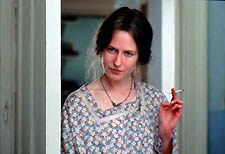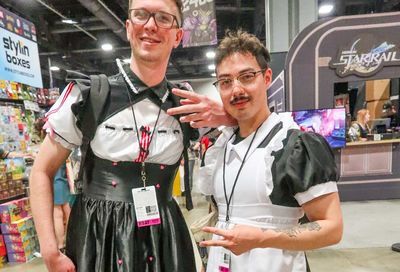Finest Hours
An actor's film, 'The Hours' is driven by three leading performances that achieve a cumulative magnificence
 |
The Hours is perhaps the most improbable mainstream-oriented movie to emerge from Hollywood this year. A character-study mood piece that envelops you like a mist, it leaves you feeling odd and slightly despondent, as though your entire environment had been altered by its haunting, elaborately woven narrative.
Based on the Pulitzer Prize-winning novel by gay author Michael Cunningham, and directed by Stephen Daldry, who made the similarly rich Billy Elliot, The Hours is comprised of three stories, set in different time periods, that intermesh, interweave, and at one surprising juncture, intersect. The foundation for the movie’s complex, triple-tiered action is 1923, as a sullen and deeply depressed Virginia Woolf (Nicole Kidman) sets out to write what would become the classic novel Mrs. Dalloway. The movie opens with Woolf’s determined and eerily serene suicide in 1941 (she places rocks into the pockets of her overcoat and walks steadfastly into the midst of a stream). The action quickly returns to 1923, where Woolf is seen leading a stifling life in Richmond, England, “held captive ” by a husband who lives “with the threat ” of her two previous suicide attempts. On this day, Woolf is paid a visit by her sister Vanessa (Miranda Richardson) and her nieces and nephews, but the visit is strained and ultimately unpleasant.
“Somebody in the novel has to die, ” she says to her young niece. When later asked by her husband why a death is necessary, she tersely replies, “So that the rest of the characters may value life. ”
In 1955, meanwhile, Laura Brown (Julianne Moore) a housewife with a seemingly picture perfect life is battling her own depression. On this particular day — her husband’s birthday — Laura bakes not one, but two birthday cakes with the help of her adoring and dependent six-year-old son. It’s also on this day that the four-month pregnant Laura, who is reading Woolf’s Mrs. Dalloway and who also learns that her friend Kitty may have cancer, makes a life-altering decision. Filling her purse with prescription drugs, she drops her son off at a baby sitter, and checks into a hotel with the intent not to check out.
The movie’s third action is set in New York, 2001, as book editor Clarrisa Vaughan (Meryl Streep) frantically prepares a party to celebrate a poet society’s lifetime achievement award given to her best friend Richard (Ed Harris). A gay man who has been ravaged by AIDS, Richard is weary of staying alive so that Clarissa, whom he calls “Mras. Dalloway ” with a blend of affection and bitterness, can have someone to look after. Clarissa and Richard’s relationship is more complicated than that, of course, but the revelations are peeled away, like the skin of an onion, much later in the film.
|
The Hours Starring Meryl Streep, Julianne Moore, Nicole Kidman and Ed Harris Directed by Stephen Daldry Rated PG-13 113 Minutes
|
Cunningham’s novel devoted chapters to each of the women, rotating between them. Daldry doesn’t need to adhere to such conventions for the film, and opts for a more free-flowing visual approach. All three parallel actions are set in the span of one day; and all three actions have an impact — both directly and indirectly — on one other.
The movie is more passive and thematic than most current day Hollywood material, but it is infinitely more involving, fortified by a rich, dramatic density. The Hours is an actor’s film, to be frank, and it’s driven by three leading performances that achieve a cumulative magnificence.
Much has been made about the transformation of Kidman — her translucent beauty has been shuttered away by the addition of a fake nose and freckles. But Kidman’s performance is more than about great makeup — the penetrating gaze with which she imbues Woolf’s character is both contemplative and unsettling. You can almost see Woolf’s intellect burst furiously from her brow.
Moore is similarly potent, but she’s done this type of role before (perhaps a little too often). Still, no one is better at capturing the illusory happiness of the ’50s housewife while revealing the pain beneath. Streep has the hardest role — she must play full-tilt natural, yet still must convey a breakdown. Clarissa is in a long-term relationship with another woman (Alisson Janney), but her relationship with Richard is more complex and, it seems, more satisfying to her. Though only in the film briefly, Harris knocks one out of the park, with a brutal and honest portrayal of an AIDS patient more than ready for the end.
The stellar supporting cast includes Stephen Dillane as Woolf’s beleaguered husband; Toni Collette, fizzy and sparkling as Kitty, the ultimate archetype of a ’50s housewife; and Jack Rovello as Laura’s wide-eyed, doting son. There’s a misstep or two: Jeff Daniels is unconvincing as a former lover of Richard’s (it’s too much of a stretch to even envision Daniels as remotely homosexual), and Clare Danes is all but cast aside as Clarissa’s daughter. But the core performances are what hold The Hours together, and provide it weight and purpose.
Acknowledgement must be made to Phillip Glass, whose swirling, spiraling score helps the movie make effortless transitions from one time period to the other (which sometimes occur in rapid succession).
There is no hope for a happy ending hope lodged within The Hours, no pat Hollywood salve. It’s a drama that gets under your skin and lingers there for many hours more after you’ve left the theatre.
Support Metro Weekly’s Journalism
These are challenging times for news organizations. And yet it’s crucial we stay active and provide vital resources and information to both our local readers and the world. So won’t you please take a moment and consider supporting Metro Weekly with a membership? For as little as $5 a month, you can help ensure Metro Weekly magazine and MetroWeekly.com remain free, viable resources as we provide the best, most diverse, culturally-resonant LGBTQ coverage in both the D.C. region and around the world. Memberships come with exclusive perks and discounts, your own personal digital delivery of each week’s magazine (and an archive), access to our Member's Lounge when it launches this fall, and exclusive members-only items like Metro Weekly Membership Mugs and Tote Bags! Check out all our membership levels here and please join us today!



















